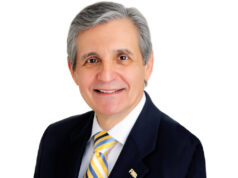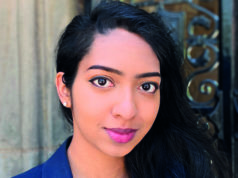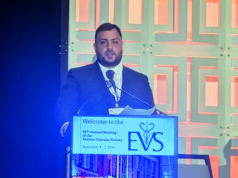
Barriers thrown up between the worlds of private or community vascular surgery and academic practice need to be dismantled for the betterment of the specialty at large. At stake are some of the very fundamentals of what makes vascular surgeons unique among specialists who tackle disease of the vasculature.
Those were some of the themes emerging out of reflections on a robust pair of sessions at the recent Society for Clinical Vascular Surgery (SCVS) Annual Symposium that focused on key questions of the future direction and demographics of the specialty.
The generational changes taking place across society at large, and in medicine and vascular surgery, found purchase in a scientific session on training and education issues such as the state of open aortic repair, but also, crucially, on matters related to diversity, equity and inclusion (DEI), and how these impact the specialty’s body politic. Outgoing SCVS President Caron Rockman, MD, director of NYU Langone’s vascular surgery residency and fellowship programs in New York, captured parallels running through some of the key existential changes taking place that the SCVS sessions brought into focus—suggesting how breaking down barriers might further the vascular surgical cause.
“In our field, as in almost all fields these days, there’s talk about increasing diversity of our workforce, and trying to recruit diverse individuals,” Rockman told Vascular Specialist. “Women in particular in the past have been traditionally, perhaps, discouraged from entering very specialized surgical fields, and this certainly has changed very significantly over the past couple of years, but I think we still have more work to do.
“The issue of the training itself, and the decrease in open aortic surgery, is a real challenging one. I don’t think it’s going to get better, because as our endovascular, or less invasive interventions, get better and better and better, there is going to be, by nature, a decrease in open aortic surgery, and the nature of that surgery is going to be more complicated.
“I thought the idea of talking about ‘private practice’ surgeons, or community surgeons, to aid in this is a wonderful resource. I also think that for those people who are doing a lot of open aortic surgery by the nature of their patient population, it would be nice if they could be assisted to start formal training programs. The lines between the ‘academic surgeon’ and the pure private practice surgeon in our field—the walls need to come down in some way. I think it’s an artificial distinction that is not necessarily helping us.”
The training and education session had touched on such topics as the Vascular Surgery Board (VSB) Certifying Examination and the virtual interviews that have been the new reality for both program directors and vascular surgery trainees over the last couple of years. And while the session delved into the number of open aortic procedures taking place in different types of vascular practices, and touched on the prospect of increased private practice involvement in training future vascular surgeons, it also heard about sobering data laying out programmatic engagement with DEI in U.S. training programs, as well as the obstetric experience of trainees.
This coalesced with some of the personal experiences laid out in the later DEI focus session. The visceral nature of some of the perspectives offered were not lost on incoming SCVS President-elect M. Ashraf Mansour, MD, professor and chair of the department of surgery at Michigan State University in Grand Rapids, who moderated the focus session, and new Vice President Jean Bismuth, MD, a vascular surgeon at the Katy Heart & Vascular Institute, in Houston, Texas, and associate professor of surgery at Louisiana State University. “My bias is that vascular surgeons are educated people,” Mansour told Vascular Specialist in a joint interview with Bismuth. “But, obviously, being educated and being sensitive are two different things. Certainly, there are some people out there who are in powerful positions who are completely insensitive and completely ignorant of the issues, and of the impact of their behavior on their trainees or their colleagues.
“When Jean and I were training, the understanding was you were going to come to work, you were going to work hard and you were not going to complain. There was no 80-hour week; if you were tired, it didn’t mean you could go home. I remember many times being tired at work and having to do more work, and falling asleep on my way home driving. I think that stuff doesn’t happen as much these days, because we have rules in place, and people are more sensitive to all of these things.”
The generational divide some of these issues exposes highlights a need for greater understanding and interaction among those of an older vintage in what is “a much more sensible and sensitive space,” continued Bismuth.
The DEI focus session heard from University of Southern California chief of vascular surgery Vincent Rowe, MD, an African American, “who bared his soul,” said Mansour, and Erica Leith Mitchell, MD, the vascular chief at the University of Tennessee Health Science Center in Memphis, over her struggles in academic medicine. Bismuth recalled the experience of a colleague, who, after speaking at a regional society meeting a few years ago about some of the struggles he was facing in his personal life, attracted some negative post-address commentary from attendees. The recent SCVS perspectives “are in direct contrast to that,” he said. “We are actually saying that we would like to hear these things. These are the human aspects of what we do every day. We share more today, and there should be a common understanding.”
Then there are those more acute training issues, such as adequate numbers of procedures in certain types of cases, particularly aortic. “The whole notion of recruiting the community surgeons to have trainees rotate through their cases is brilliant,” Bismuth reflected. Even if only 30–40% of those in private practice were keen on the idea, that would represent big progress, he added. “And it brings the private practice guys into the circle in a very meaningful way. We keep on talking about how to involve the private practice guys more—I can’t think of a better way.”











